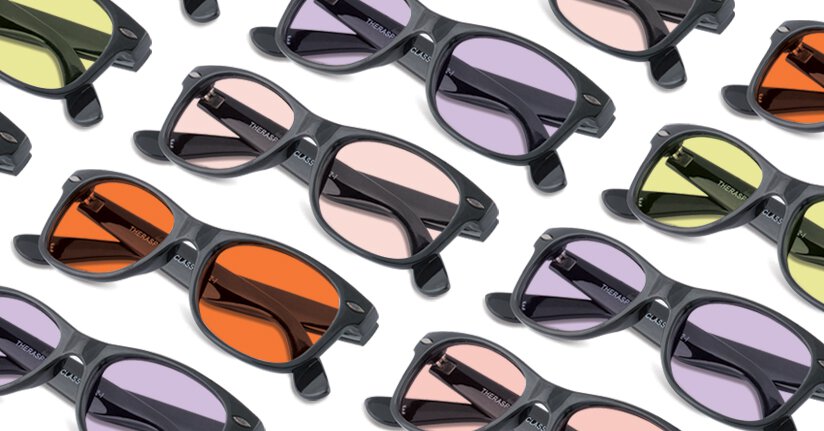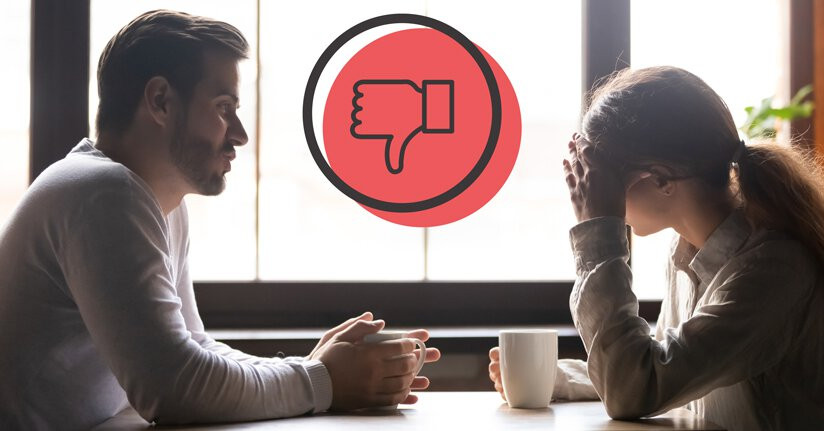15 Things You Shouldn’t Say to Someone with Light Sensitivity
Stigma surrounds chronic illness, from the public comingling of migraine and “headache” terminology to the frequent dismissal of invisible symptoms. People with light sensitivity (photophobia) are not immune from experiencing its harmful effects, in large part because others can’t see the symptom nor fully understand its impact.
This stigma surrounding the experiences and symptoms of light sensitivity often plays out in the language and conversation that we have with others. And even if unintentional, those without photophobia can perpetuate the negative perceptions and stereotypes that are attached to it. We want to identify those phrases and statements that can be emotionally triggering for patients as well as offer some helpful alternatives you can try.

"Are you hung over?"
If a person with photophobia is wearing sunglasses indoors or needs the solitude of a darkened space, the last thing they want to hear is somebody else assuming they had too much to drink the night before. Instead, you may want to ask them “How are you feeling today?” and allow them to share what they are going through (if they want to offer that information).
"You live like a vampire."
While many light-sensitive people point out that the symptom makes them feel like they are a vampire living in constant darkness, it still can come off as judgmental from one who doesn’t experience it on a regular basis. Try starting with curiosity about the reason they have their environment set up in that way and follow it up with empathy and understanding.
"You look fine."
"It must not be that bad."
"At least you’re not disabled."
If ever there was a series of statements that could inspire anger and frustration for a person with chronic illness, it would be these. Invisible symptoms are just that: invisible. You can’t see them, you can’t truly evaluate how they are affecting somebody; and many who have these issues have mastered the art of functioning through pain anyway so you don’t have to see them in a challenging moment. As a result, it’s best to never assume that you know what another person is going through at any given time. Instead, it might be better to simply acknowledge that you cannot appreciate their situation with this: “I can’t imagine what you’re feeling right now.”
"We’re just going to a {grocery store}. It’s no big deal."
It can be hard for even your closest friends to fully appreciate the burden of light sensitivity. Missed outings and canceled social engagements are par for the course, especially when it involves a location (like the grocery store, for example) that has a threat of triggering light sources. In fact, it can take just mere minutes of exposure to bring on a person’s symptoms.
Avoid minimizing their concern and accept their final decision, such as: “I’d love for you to join us today, but I totally understand if you can’t.” You could even go a step further by offering to investigate the lighting situation beforehand or by finding an alternative place or activity that is more photophobia friendly.
"Why don’t you take some medication for that?"
"Why don’t you just cut back on your screen time?"
No two people experience photophobia in the same way—from the intensity and frequency of their episodes to the specific light sources that trigger them. Moreover, there is no medication that directly treats light sensitivity, and in fact, it can take a multitude of products and behavioral changes just to make us functional. Overly simplistic suggestions like taking medication or reducing screen time do not account for the complex factors associated with photophobia. Again, adopting a curious approach can be a useful alternative: “What are some of the ways you manage the impact of light triggers?” for example.
"You must be struggling today."
Calling attention to another individual’s symptoms can feel like an unwanted spotlight. Although many with invisible and/or chronic illnesses are great advocates for raising awareness about their experiences, some days they just want to blend in with everybody else. Plus, if you see a photophobic person adopting a symptom management tactic (such as wearing therapeutically-tinted glasses for light sensitivity), they may be trying to prevent their light sensitivity from developing at all; it doesn’t mean they are currently in pain. A better approach would be to phrase it this way: “Let me know if you’re not feeling okay and if there’s anything I can do to help.”
"Those glasses make you look like Bono or Elton John."
As a company who makes blue light glasses for light sensitivity and other migraine- and photophobia-reducing lenses that have a noticeable color (on account of their therapeutic filter), we’ve heard this conversation a time or two. It’s natural to be interested in these types of products and how they work, but you should never make somebody feel insecure about wearing or using them. It’s far more appropriate to ask about their purpose and benefits: “Those glasses are really unique. What do they do?”
"My computer screen bothers me too."
"I also get headaches because of blue light."
"Everybody is sensitive to bright lighting."
It is understandable when somebody tries to connect their experiences to those of a light-sensitive person. However, even the most well-intentioned effort can ring hollow because, unless they live with photophobia daily, they can never really know what it’s like to have it. While we never want anybody to forgo sharing their own insights, in this case it would be wise to rephrase these comments into a question such as: “I’d love to learn more about what you go through. Are you willing to show me how light affects you differently from the average person?”
"Do you still get light sensitivity?"
"I’m sure it will go away soon."
As much as possible, it is important to be educated about photophobia if you plan to speak about it. The fact is light sensitivity does not usually disappear on its own—it’s not ‘here one day and gone the next.’ Like other chronic conditions (and their symptoms), they can get worse for some and lessen for others. And for a large percentage of people, it will be with them for the duration of their adult lives. In addition, some patients are light sensitive all of the time, so it never fully goes away, even if the severity ebbs and flows.
As usual, being a friend and ally is the way to go. “How can I support you during this time?” has a greater likelihood of being received in a positive light.

Tips for How to Respond to Insensitive Statements
If you deal with light sensitivity, you have every right to feel frustrated and upset when faced with insensitive comments from others. However, that does not always translate to better, more productive conversations about the topic. Here are a few tips to help you respond in these situations in a way that is positive for both parties.
*Note: In no way are we saying that patients must do all the work (after all it takes two to tango), but we do want to provide practical strategies for moving forward.
- Assume best intent—at least up to a point. Most of these statements stem from a lack of awareness or education about photophobia. While that is not an excuse, it allows for the opportunity to grow in a positive way. That said, if you feel somebody is acting in bad faith or is a repeat offender, voice your concerns with them as directly as possible.
- Education is key, but not your sole responsibility. The ability to learn from the experiences of an individual with light sensitivity is a powerful tool to help bridge the knowledge gap. However, it should not be the sole obligation of a light-sensitive person to create this education; we all have a duty to be better informed about it.
- Default to sharing, but establish personal boundaries. If somebody is genuinely curious about what you go through with photophobia, try to answer their questions as long as you are up for it. Yet make sure to set, communicate and remain firm with your boundaries; after all, there are just those times where you don’t want to divulge personal details about your health and/or you’re exhausted from doing too much of it.
- Don’t hesitate to cut people out of your life. Sometimes the only approach you can take with a person who refuses to engage in constructive discussions and/or respect your boundaries is to end the relationship with them. If that is too difficult (because they are a family member, for example), then make it clear that you will no longer engage in conversation about your health with them. Having photophobia is difficult enough, and no one should also have to put up with intentionally rude or disrespectful people.
We hope this information ultimately facilitates more meaningful talks around light sensitivity for all involved.
TheraSpecs Glasses for Light Management
Try our light-filtering glasses and stay protected against harsh light from screens, fluorescents, LEDs, unwanted blue light, bright sunlight, flashing lights, and more.





